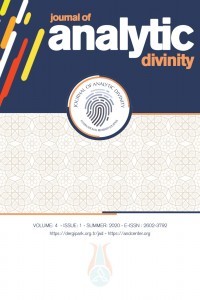Kur’an’da Allah ism-i Celâl’indeki Nazım Belagatı: Mef’ûlün Bih Örneği
Allah, Retorik, Belagat, Nahiv, Mef’ûlün Bih.
The Rhetoric of The Arrangement of The Name “Allah” in the Quran: Mafulun Bih Example
___
- Abbas, Hasan. en-Nahvu’l-vâfî. 3. Baskı. Yy.: Darü’l-mearif, ts.
- Ahmed Muhtar, Ömer. Mu’cemu’l-lugatu’l-Arabiyye. Yy.: ‘Alemü’l-Kütüb, 2008.
- Alûsî, Ebü’s-Senâ Şihâbüddîn Mahmûd b. Abdillâh b. Mahmûd el-Hüseynî. Ruhu’l-me`anî. Beyrut: Daru İhyâi’t-Türasi’l-Arabi, ts.
- Amir b. Tufeyl. Dîvanu Amir b. Tufeyl. Beyrut: Daru’s-Sadr, 1979.
- Avde, Halîl. et-Tadavvuru’d-delâlî beyne lügati’ş-ş’iri’l-cahili ve lugati’l-Kur’ani’l-Kerim. Ürdün: Mektebetü’l-Menar, 1985.
- Bâkıllânî, Ebû Bekr Muhammed b. Tayyib b. Muhammed el-Basrî. İʿcâzü’l-Kurʾân. Thk. Ahmed Sakr. 3. Baskı. Kahire: Darü’l-Mearif, ts.
- Bikaî, Ebü’l-Hasen Burhânüddîn İbrâhîm b. Ömer b. Hasen er-Rubât el-Hırbevî. Nazmü’d-dürer fî tenasûbi’l-ayati ve’s-süver. Kahire: Darü’l-Kitabi’l-İslami, ts.
- Cürcânî, Ebû Bekr Abdülkāhir b. Abdirrahmân b. Muhammed. Delâilü’l-icâz. Thk. Mahmud Muhammed Şakir. Kahire: Mektebetü Hanci, ts.
- Ebû Dâvûd, Süleymân b. el-Eş‘as b. İshâk es-Sicistânî el-Ezdî. es-Sünen. Thk. Muhammed Muhyiddin Abdülhamid. Beyrut: el-Mektebetü’l-Asrıyye, ts.
- Ebu’s-Suûd, İrşâdü’l-ʿakli’s-selîm. Beyrut: Daru İhyâi’t-Türasi’l-Arabi, ts.
- Endelüsî, Ebû Hayyân Muhammed b. Yûsuf b. Alî b. Yûsuf b. Hayyân. el-Bahrü’l-muhît, Thk. Adil Ahmed Abdülmevcud. Beyrut: Daru’l-Kütübi’l-ilmiyye, 1993.
- Fadıl es-Samuraî. Meâni’n-nahv. Amman: Daru’l-Fikr, 2000.
- İbn Âşûr, Muhammed et-Tâhir b. Muhammed b. Muhammed et-Tâhir et-Tûnisî. et-Tahrîr ve’t-tenvîr. Tunus: Daru’t-Tunusiyye, 1984
- İbn Manzûr, Ebü’l-Fazl Cemâlüddîn Muhammed b. Mükerrem b. Alî b. Ahmed el-Ensârî. Lisanü’l-Arab. Mısır: Darü’l-Mearif, 1979.
- İbn Teymiyye, Ebü’l-Abbâs Takıyyüddîn Ahmed b. Abdilhalîm. el-ʿAḳīdetü’t-Tedmüriyye. Thk. Muhammed b. Avde’s-Suûdî. 6. Baskı. Mektebetü’l-Abikan, 2000.
- İbn Ukeyl, Ebû Muhammed Bahâüddîn Abdullah. Şerhu İbn Ukeyl. Thk. Muhammed Muhyiddin Abdülhamid. 20. Baskı. Kahire: Darü’t-Türas, 1980.
- İbn Yaîş, Yaîş b. Ali. Şerhu’l-mufassal. Thk. İmil Bedî Yakub. Beyrut: Daru’l-Kütübi’l-İlmiyye, 2001.
- İsfahânî, Ebü’l-Kāsım Hüseyn b. Muhammed b. el-Mufaddal er-Râgıb. el-Müfredât. Thk. Saffan Adnan Dâvûdî. 4. Baskı. Dımaşk: Daru’l-Kalem, 2009.
- Kazvînî, Ebü’l-Meâlî Celâlüddîn el-Hatîb Muhammed b. Abdirrahmân b. Ömer b. Ahmed. el-Îzah fî ulumi’l-belaga. Thk. İbrahim Şemsüddin. Beyrut: Daru’l-Kütübi’l-İlmiyye, 2003.
- Kefevî, Eyyüb b. Musa el-Hüseynî. el-Külliyât. 3. Baskı. Beyrut: Müessesetü’r-Risâle, 1998.
- Kurtubî, Ebû Abdillâh Muhammed b. Ahmed b. Ebî Bekr b. Ferh. el-Cami’ li ahkami’l-Kur’an. Thk. Abdullah b. Abdulmugsin et-Türkî. Müessesetü’r-Risale, 2006.
- Muhammed Süleyman Yâkut. İ’rabu’l-Kur’ani’l-Kerim. Darü’l-Marifeti’l-Camiiyye, ts.
- Nabia ez-Zeybânî. Divanü en-Nabia ez-Zeybânî. Thk. Abbas Abdüssettar. 3. Baskı. Beyrut: Daru’l-Kütübi’l-İlmiyye, 1996.
- Nasr Hamid Ebû Zeyd. Mefhumu’n-Nass, el-Heyetü’l-‘Ammetü’l-Mısriyye, 1990.
- Neysaburî. Esbâbu’n-nüzûl. Thk. Besyûnî. Beyrut: Daru’l-Kütübi’l-İlmiyye, 1991.
- Radî, Muhammed b. el-Hasen el-İsterâbâzî es-Semnâî. Şerḥu’r-Radî li kafiyeti İbnü’l-Hacib. Thk. İbrahim el-Hıfdî. Camiatü’l-İmam Muhammed b. Suûd, 1993.
- Sekkâkî, Ebû Ya‘kūb Sirâcüddîn Yûsuf b. Ebî Bekr Muhammed b. Alî el-Hârizmî. Miftâḥu’l-ʿulûm. Thk. Abdülhamit Handâvî. Beyrut: Daru’l-Kütübi’l-İlmiyye, 2000.
- Süyûtî, Ebü’l-Fazl Celâlüddîn Abdurrahmân b. Ebî Bekr b. Muhammed el-Hudayrî. Hemu’l-hevâmi’ fî şerhi cemu’l-cevami’. Thk. Abdülâl Salim. Beyrut: Müessesetü’r-Risâle, 1992.
- Tirmizî, Ebû Îsâ Muhammed b. Îsâ b. Sevre. Thk. Beşşar Avad Maruf. el-Câmiʿu’ṣ-ṣaḥîḥ. Beyrut: Daru’l-Garbi’l-İslami, 1998.
- Zemahşerî, Ebü’l-Kāsım Mahmûd b. Ömer b. Muhammed el-Hârizmî. el-Keşşaf. Thk. Adil Ahmed Abdülmevcûd. Mektebetü’l-Abikan, 1418.
- Yayın Aralığı: Yılda 2 Sayı
- Başlangıç: 2017
- Yayıncı: Özcan GÜNGÖR
Cenksu ÜÇER, Hatice Kübra ÇELEBİ
Talim’ül Müteallim, Yazar: İmam Burhaneddin Ez-Zernuci (İstanbul: Şifa Yayınevi, 2008)
Had Kavramının İslami İlimlerde İfade Ettiği Anlam ve Kur’an’da Hudûdullah Kavramı
Kemalpaşazâde’ye Göre Şerrin Allah’a Nispeti Problemi
İlahi Dinlerde Oruç: Kaynağı, Amacı ve Uygulanışı Bakımından Karşılaştırmalı Bir İnceleme
Nitelik Bağlamında Kur’an Tilâvetinin Keyfiyeti ve Eğitimi Üzerine Bir İnceleme
Kur’an’da Allah ism-i Celâl’indeki Nazım Belagatı: Mef’ûlün Bih Örneği
Necib Mahfuz’un Kısa Öykülerinde Türk Figürü
Kahramanın Yolculuğu Miti Çerçevesinde Mantıku’t -Tayr Adlı Eserde Hakikat Arayışı
